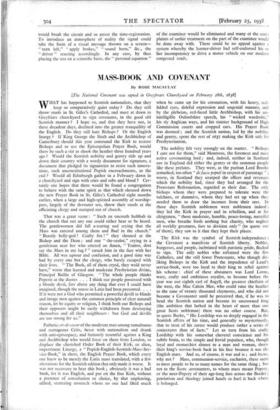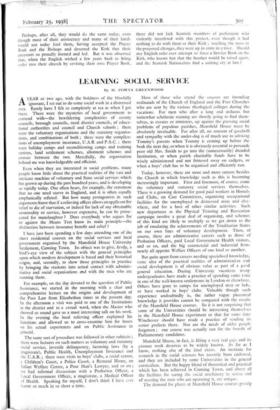MASS-BOOK AND COVENANT
By ROSE MACAULAY
[The National Covenant was signed in Greyfriars Churchyard on February 28th, 1638] WHAT has happened to Scottish nationalists, that they keep so comparatively quiet today ? Do they still throw stools in St. Giles's Cathedral, and meet at dawn in Greyfriars churchyard to sign covenants, in the good old Scottish manner ? .I hope so, and that they have not, in these decadent days, declined into the greater tranquillity of the English. Do they still hate Bishops ? Or the English liturgy ? If King George the Sixth and the Archbishop of Canterbury should this year command the Kirk to restore Bishops and to use the Episcopalian Prayer Book, would there be such a stir as shook the heather three hundred years ago ? Would the Scottish nobility and gentry ride up and down their country with a wordy document for signature, a document that pledged its signatories to resist such innova- tions, such unconstitutional Popish encroachments, to the end ? Would all Edinburgh gather in a February dawn in a churchyard and sign with cries and sobs and blood ? Cer- tainly one hopes that there would be found a congregation to behave with the same spirit as that which shouted down the new Prayer Book in St. Giles's Cathedral eight months earlier, when a large and high-spirited assembly of worship- pers, largely of the devouter sex, threw their stools at the officiating clergy and stamped out of church.
That was a great scene : " Such an uncouth hubbub in the church that not any one could either hear or be heard. The gentlewomen did fall a-tearing and crying that the Mass was entered among them and Baal in the church." " Beastly belly-god ! Crafty fox ! " they shouted at the Bishop and the Dean ; and one " she-zealot," crying to a gentleman near her who uttered an Amen, " Traitor, dolt say the Mass in my lug ? " struck him in the face with her Bible. All was uproar and confusion, and a good time was had by every one but the clergy, who barely escaped with their lives. " The Book, all of them cryed, they wold never have," wrote that learned and moderate Presbyterian divine, Principal Bailie of Glasgow. " The whole people thinks Poperie at the doores . . . I think our people possessed with a bloody devil, farr above any thing that ever I could have imagined, though the masse in Latin had been presented. . . . If it were not a God who permitted a powerful devil to blinde and inrage men against the common principle of clear naturall reason, let be equity or religion, I think both our Bishops and their opposers might be easily withdrawn from destroying themselves and all their neighbours : but God and devills are too strong for us."
Pathetic cri-de-coeur of the moderate man among tumultuous and outrageous Celts, fierce with nationalism and drunk with anti-episcopacy, and furiously resentful against a King and Archbishop who would force on them from London, to displace the cherished Order Book of their Kirk, an alien, impertinent Liturgy, a " Popish-English-Scottish-Mass-Ser- vice-Book," in short, the English Prayer Book, which every one knew to be merely the Latin mass translated, with a few alterations for the Scottish edition that only made it worse. It was not necessary to hear this book ; obviously it was a bad book, for it was English, and put on the free Kirk, without a pretence of consultation or choice, by that unpleasing, stilted, stuttering monarch whom no one had liked much when he came up for his coronation, with his heavy, red- lidded eyes, doleful expression and ungenial manner, and by the plebeian, red-faced little Archbishop, with his un- intelligible Oxfordshire speech, his " wicked wardrobe," his sly Anglican ways, and his sinister background of High Commission courts and cropped ears. His Prayer Book was doomed ; and the Scottish nation, led by the nobility and gentry, spent the rest of 1637 making the Kirk safe for Presbyterianism.
The nobility felt very strongly on the matter. " Bishops I care not for them," said Montrose, the foremost and most active covenanting lord ; and, indeed, neither in Scotland nor in England did either the gentry or the common people like these prelates. They were, as the puritan Lord Brooke remarked, too often " de faece populi in respect of parentage " ; worse, in Scotland they usurped the offices and revenues which the nobility had, since they had arranged for the Protestant Reformation, regarded as their due. The only bishops whom they were prepared to tolerate were the tulchans, or dummies, whom they had set up when they needed them to draw the incomes from their sees. In those days Scottish noblemen were noblemen indeed they led the Kirk in prayer and in rebellion, and as for clergymen, " those moderate, humble, peace-loving, merciful men, who breathe forth nothing but charity, who neglect all worldly greatness, foes to division only " (to quote one of them), they saw to it that they kept their places.
The Kirk was the symbol of Scottish independence ; the Covenant a manifesto of Scottish liberty. Nobles, burgesses, and people, inebriated with patriotic pride, flocked to sign. The only nobles who refrained were the few Catholics, and the still fewer Protestants, who though dis- liking Bishops in the Kirk and the impudence of Laud's service-book, were too loyal to their king to rebel against his scheme : chief of these abstainers was Lord Lorne, wary, crafty and ambitious royalist, to become before the year was out eighth earl of Argyll, the greatest chieftain of the west, the Mac Calein Mor, who could raise the heather to the tune of twenty thousand claymores, and who did not become a Covenanter until he perceived that, if he was to head the Scottish nation and become its uncrowned king (the ambition that lurked in the heart of more than one great Scots nobleman) there was no other . course. But, to quote Burke, " His Lordship was so deeply engaged in the Scottish affairs of his time, and generally so mysteriously, that to treat of his career would produce rather a series of conjectures than of facts." Let us turn from his craft Lordship with his somewhat cheverel conscience and his subtle brain, to the simple and fervid populace, who, though loyal and monarchist almost to a man and woman, threw their king's service-book back in his face because it was the English mass. And so, of course, it was and is ; and bueno, why not ? Mass, communion-service, eucharist, these seem to most people to be so many names for the same thing ; but not to the Scots covenanters, to whom mass meant Popery, or the near-Popery of their age-long foes across the Border ; patriotism and theology joined hands to hurl it back where it belonged. Perhaps, after all, they would do the same today, even though most of their aristocracy and many of their lairds would not today lead them, having accepted the Prayer Book and the Bishops and deserted the Kirk that their ancestors so proudly formed and led. But it was observed that, when the English wished a few years back to bring order into their church by revising their own Prayer Book, :there did not lack Scottish members of parliament who violently - interfered with this project, even though it had nothing to do with them or their Kirk ; smelling the mass in • the proposed changes, they were up in arms in a trice. Should any English ruler ever attempt to' force a Service Book on the Kirk, who knows but that the heather would be raised again, and the: Scottish Nationalists find a uniting cry at last ?

















































 Previous page
Previous page